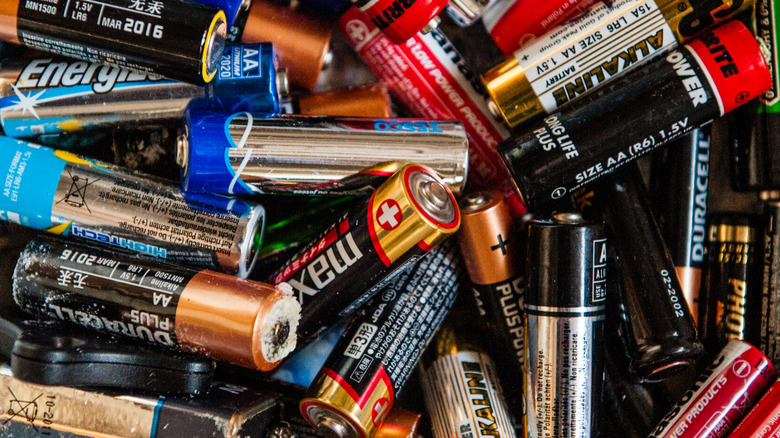Is The Freezer Actually The Best Place To Store Batteries?
Chances are you'll go through a decent amount of batteries in your household over the years, what with all the electronic devices that still rely on good old AA and AAA options rather than beefier lithium-ion offerings. Though a handful of remotes — and maybe some miscellaneous children's toys — don't exactly eat through these tiny power sources at a rapid pace, you're likely to end up with a bit of a stockpile unless you only buy exactly what you need at any given time.
Then comes the problem of what to do with those unused but still perfectly good replacement batteries. Naturally it's better to hang onto them rather than toss them out (also don't just trash them), but you don't want them to slowly lose effectiveness over time. After all, you may not need to change the batteries in your TV remote for a few years, at which point those fresh unused batteries could have run down some of their lifespan due to inactivity.
This is where your fridge or freezer come in, with there being a widely-held (or at least widely-spread) belief that keeping your spare or unused batteries in a cold box will slow their regular lifespan reduction over time. But how well does this actually work?
It's a myth for a reason
As prolific as the idea of at-home cold storage prolonging battery life has become, it's ultimately about as helpful as letting your phone's battery reach zero before recharging or closing apps to preserve energy. Which is to say it doesn't actually help at all.
Two major battery brands, Duracell and Energizer, both state very clearly that fridge or freezer storage will not actually lengthen the life of your batteries. It's true that storing them in a particularly hot climate can reduce capacity or cause direct damage (like a rupture or leak), but the answer to this problem isn't the opposite extreme. Regular room temperatures (about 68- to 77-degrees Fahrenheit), ideally in their original packaging, is the recommended way to store your unused batteries.
It's not just ineffective, though — keeping your batteries in the fridge or freezer is actually a bad idea due to all the moisture and the potential harm it can lead to. Non-dry climates like these can cause condensation to build up on the batteries, which can start to corrode various bits like the contacts or seal. And corroded batteries are, at best, ineffective. Or downright dangerous at worst. So rather than keeping your batteries in your fridge or freezer, find a dry and temperate spot in your home to keep them instead. Just don't forget where you left them.

